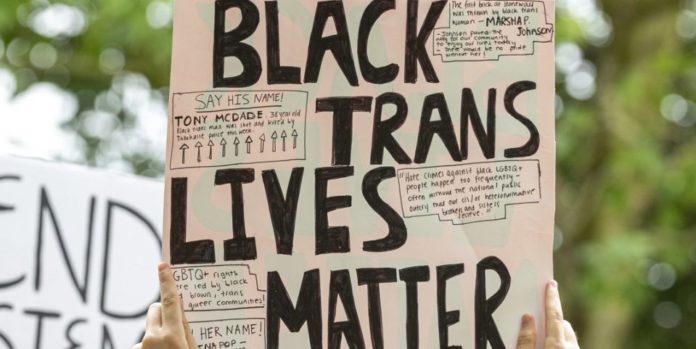Right now, we may be living through the most impactful time for trans and nonbinary people, and the choices we make now may shape the trans community for decades to come.
At the end of May, Tony McDade — a 38-year-old Black trans man — was shot by a Tallahassee Police officer. Onlookers claim that officers shouted at McDade to hold still. They then shot him once he halted. The officer is on administrative leave.
While McDade’s killing is getting a lot less coverage than that of George Floyd or Breonna Taylor, his is, nevertheless, one of many that has spurred on a renewed Black Lives Matter movement, leading to weeks of protests, a lot of performative hand-wringing and maybe the first inklings of change in the radicalized, militarized police forces across the United States.
Yet, even at one of these protests, a 21-year-old Black trans woman, Iyanna Dior, was attacked by 30+ people outside of a gas station in Minneapolis.
She is lucky to have survived, but Dominique Fells and Riah Milton weren’t so fortunate. They are the 12th and 13th people to die at the hands of anti-transgender violence in 2020. Milton, from Cincinnati, was shot to death, while Fells was found dismembered on the banks of the Schuylkill River in Philadelphia. Both were discovered the same day.
Further highlighting police brutality toward trans people, details came out in the death of Layleen Polanco. Polanco, 27, died in Rikers Island prison after having an epileptic seizure. The guards mocked her as she died.
She was held on $500 bail stemming from a 2017 sex work charge.
Meanwhile, the United States Department of Health and Human Services has moved to reverse transgender health protections put in place by the Obama Administration. Roger Severino, director of the Office for Civil Rights in the HHS, has been working toward this for years, releasing it during Pride Month, on the fourth anniversary of the Pulse shooting.
A point of clarity: this isn’t necessarily about transgender-specific care. This ruling means that any medical professional will be able to discriminate against transgender patients no matter what ailment they may be facing — for example, COVID-19 treatment, a broken arm or anything else.
Similar moves are happening right now in the United Kingdom, as Prime Minister Boris Johnson looks to halt plans to streamline trans self-identity; in Hungary, where their parliament has voted to end legal recognition for trans people; and in Puerto Rico, which has stripped the right of transgender people to change their birth certificates, even while the Commonwealth has seen a marked increase of violence against transgender people.
In the midst of all this, a multimillionaire fantasy writer J.K. Rowling has decided to let us know just how much she dislikes transgender people, causing a furor that has threatened to overwhelm far more vital news.
After months of “is she or isn’t she anti-trans” on Twitter, and days after she accidentally posted a sentence related to an anti-transgender news story into a light post about a children’s drawing, Rowling decided to clear the air. First, she went on a rant about an article that referred to “people who menstruate,” claiming it was erasing women to include trans men and nonbinary people.
Days later, just as things had started to calm down, she posted a 3,500 or so word manifesto on transgender people. The tome, unlikely to be adapted to a stage play or blockbuster movie, regurgitates every anti-transgender claim used over the last decade, from claims that trans men only transition to gain the societal advantages of men to once again resurrecting bathroom predator panic.
I will not bore you with a point-by-point repudiation of her screed, though plenty of others have gone through it. Suffice it to say that it is full of long disproven scaremongering and more than a few outright falsehoods about transgender people. If anything, I find it a sorry document, written by someone who has decided to fall into some very lazy thinking, prodded along by a certain cadre of anti-transgender campaigners.
Indeed, I find the whole situation a sad one. I feel sorry for all the fans, particularly those who are trans, nonbinary, or their friends, all of whom are now retiring their scarves and stuffed owls. Yet I also feel sorry for Rowling who, I suspect, will come to realize in a decade or two just how wrong she was and how much she may have betrayed her fans and herself by digging in her heels.
In one of her fantasy books, a wizard named Albus Dumbledore said, “It is our choices…that show what we truly are, far more than our abilities.” Rowling has made the choice to stand with Johnson, the Trump administration and others. She has chosen to be on the side of those who beat us, kill us and mock our deaths.
But Rowling is not the big news of the week.
In a 6-3 decision written by one of the conservative judges, Neil Gorsuch, the Supreme Court of the United States decided that employment protections for transgender people under Title VII are law, meaning that you cannot fire a person based on their trans status. This ruling will also likely doom attempts at rolling back protections elsewhere, like that of the HHS.
Also, on Sunday, the 15th of June, as many as 15,000 people gathered at the Brooklyn Museum for a silent march and rally. Their cause? Speaking out in support of Black trans lives.
Gwen Smith doesn’t live under the stairs. Rather, you’ll find her at www.gwensmith.com

